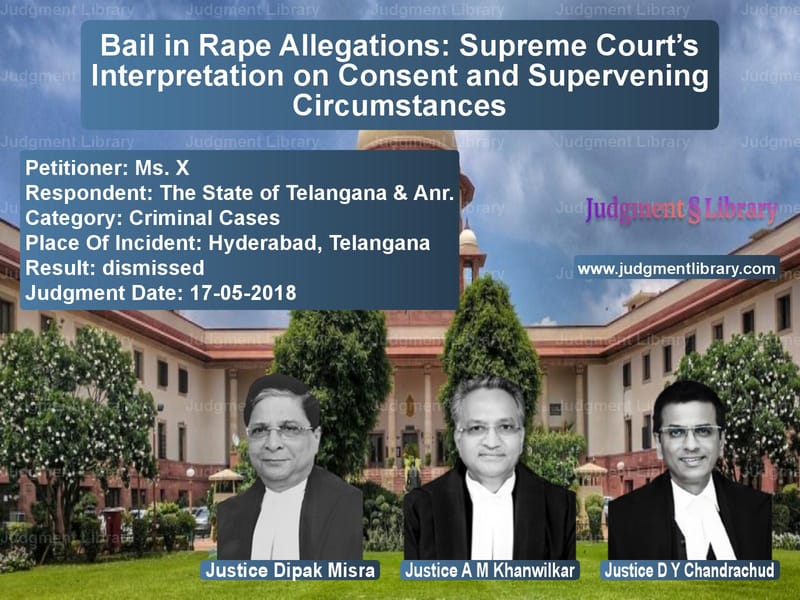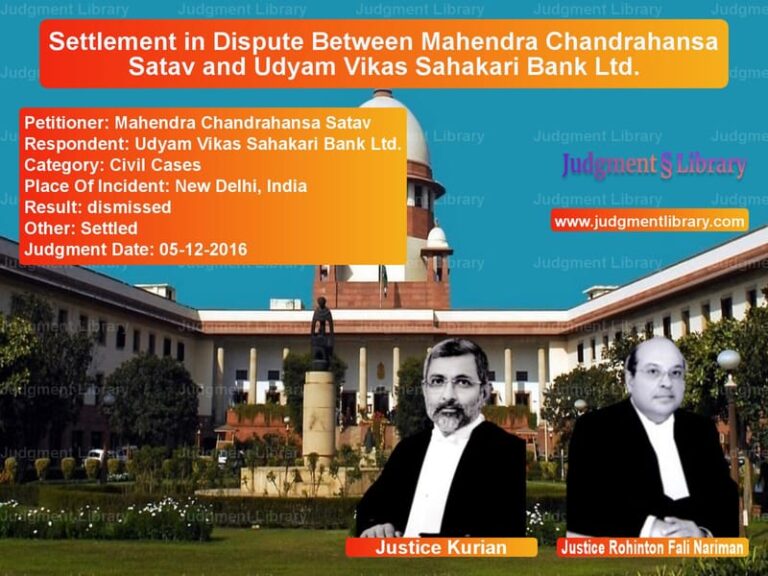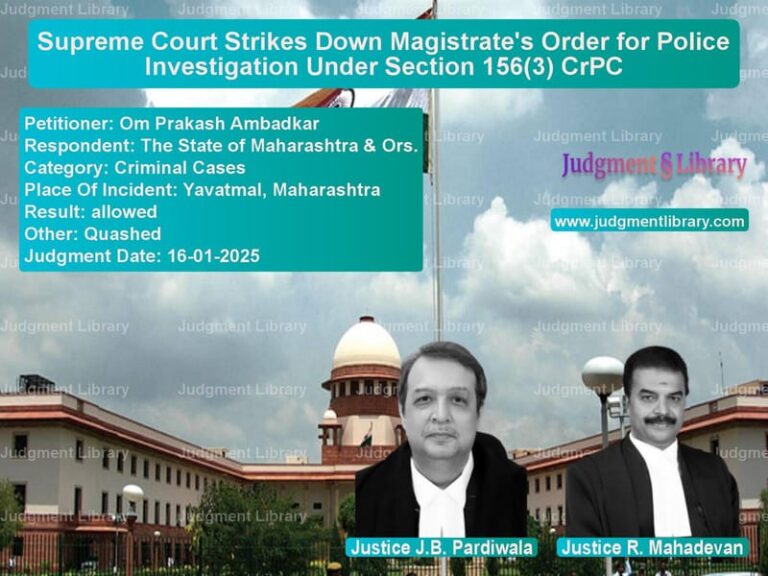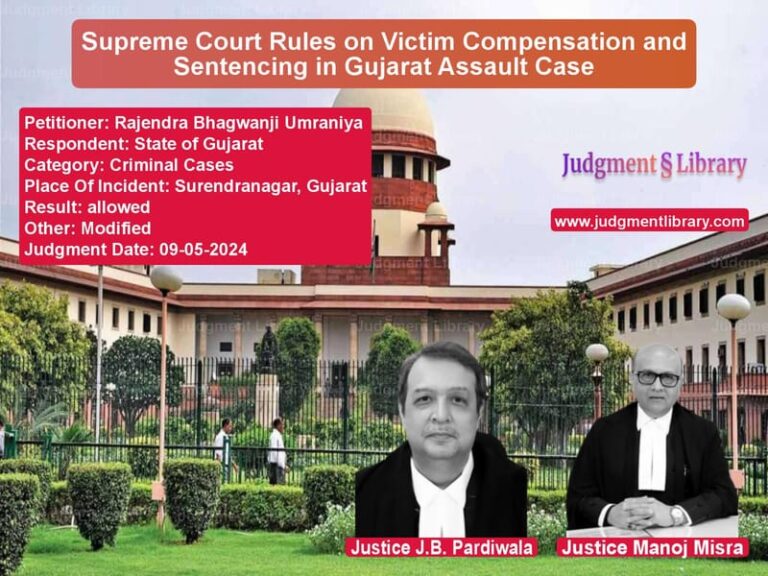Bail in Rape Allegations: Supreme Court’s Interpretation on Consent and Supervening Circumstances
The case of Ms. X vs. The State of Telangana & Anr. revolves around serious allegations of rape, wrongful confinement, and criminal intimidation. The Supreme Court was tasked with evaluating whether the bail granted to the accused—a film producer—by the High Court was justified and whether any supervening circumstances warranted its cancellation. The case brings to light the nuanced legal approach to allegations of sexual offenses, especially in relationships where there exists a power dynamic.
Case Background
The complainant, an aspiring actress, alleged that she was raped multiple times between July 2015 and January 2016 by the accused. She claimed that he first sexually assaulted her in Mumbai after intoxicating her, and later in Hyderabad during a film shoot. The complainant stated that the accused made false promises of marriage and exploited her repeatedly, using his influence as a film producer.
The complaint was filed on January 10, 2017, nearly a year after the last alleged incident. Following an investigation, a charge-sheet was filed on March 6, 2018, charging the accused under Sections 376, 342, 493, 506, and 354(C) of the Indian Penal Code.
Legal Issues Raised
1. Grant of Bail by the High Court
The High Court granted bail to the accused on November 17, 2017, reasoning that:
- The accused had been on anticipatory bail for eight months without any allegations of misconduct.
- The delay in filing the complaint cast doubts on the credibility of the allegations.
- All material witnesses had been examined and the investigation was substantially complete.
- The accused had not violated any bail conditions in his previous cases.
- The complainant was an adult who had willingly visited the accused multiple times.
2. Supervening Circumstances Raised by the Complainant
After bail was granted, the complainant filed an additional FIR on November 22, 2017, alleging that she was being followed and pressured to withdraw her case. She claimed that her car was intentionally obstructed by an auto-rickshaw and that she was offered Rs. 5 crores to settle the matter.
The complainant’s counsel argued that these incidents demonstrated an attempt to influence and intimidate her, justifying the cancellation of bail.
3. The Defense’s Arguments
The defense, led by senior counsel Mukul Rohatgi and Sidharth Luthra, countered that:
- The additional FIR was filed only four days after bail was granted, suggesting an attempt to manufacture a supervening circumstance.
- The accused had already spent 58 days in custody before securing bail.
- The complainant’s own actions, such as traveling with the accused and staying in hotels, indicated a consensual relationship.
- The complainant’s original allegations included a claim of false promises of marriage, which was later diluted in her rejoinder.
- The accused had cooperated with the investigation and had no history of tampering with evidence.
Supreme Court’s Observations
The Supreme Court analyzed whether the High Court’s decision to grant bail was justified and whether the complainant had provided sufficient evidence of supervening circumstances to warrant cancellation.
1. Legal Principles on Granting and Cancelling Bail
The Court cited precedents emphasizing that:
- Granting bail requires considering the gravity of the offense, the evidence available, and the likelihood of the accused interfering with the trial.
- Once bail is granted, cancellation requires “very cogent and overwhelming circumstances”.
- Supervening events must demonstrate that the accused is abusing bail conditions or obstructing justice.
Quoting from Dolat Ram v. State of Haryana, the Court reiterated:
“Bail once granted should not be cancelled in a mechanical manner without considering whether any supervening circumstances have rendered it no longer conducive to a fair trial.”
2. Delay in Filing the Complaint
The Court acknowledged that while delay in reporting a sexual offense does not invalidate the complaint, it is a relevant factor in bail considerations. The fact that the complainant filed her case nearly a year after the alleged incidents was noted as a crucial aspect in evaluating the credibility of the allegations.
3. Consensual Relationship vs. Allegations of Rape
The complainant initially claimed that the accused had made false promises of marriage. However, during the hearing, her counsel distanced from this argument, stating:
“This is not a case involving a breach of a promise to marry.”
The Court found this inconsistency significant, particularly when assessing whether the accused’s conduct constituted coercion or was part of a consensual relationship.
4. No Evidence of Bail Misuse
The Supreme Court found no evidence that the accused had misused bail. The complainant’s allegations regarding threats and intimidation were deemed vague and insufficiently substantiated.
Final Judgment
The Supreme Court upheld the High Court’s decision to grant bail, stating:
“No supervening circumstance has been made out to warrant the cancellation of bail. There is no cogent material to indicate that the accused has been guilty of conduct which would warrant his being deprived of his liberty.”
However, the Court modified the bail conditions by increasing the personal bond from Rs. 50,000 to Rs. 10 lakhs, acknowledging the gravity of the allegations.
Implications of the Judgment
This judgment has far-reaching implications for cases involving sexual offense allegations:
- It reinforces that delayed complaints must be carefully scrutinized during bail hearings.
- It affirms that bail cannot be revoked lightly without clear evidence of misuse.
- It highlights the importance of consistent allegations, especially in cases where consent and coercion are debated.
- It clarifies that while sexual offenses are serious, mere accusations are insufficient to deny bail indefinitely.
Conclusion
The case of Ms. X vs. The State of Telangana & Anr. serves as a crucial precedent in determining bail conditions in sexual offense cases. While the Court acknowledged the seriousness of the allegations, it emphasized the necessity of maintaining a balance between the rights of the accused and the complainant. This ruling underscores the principle that bail once granted should not be revoked unless there is compelling evidence of its misuse.
Petitioner Name: Ms. X.Respondent Name: The State of Telangana & Anr..Judgment By: Justice Dipak Misra, Justice A M Khanwilkar, Justice D Y Chandrachud.Place Of Incident: Hyderabad, Telangana.Judgment Date: 17-05-2018.
Don’t miss out on the full details! Download the complete judgment in PDF format below and gain valuable insights instantly!
Download Judgment: Ms. X vs The State of Telanga Supreme Court of India Judgment Dated 17-05-2018.pdf
Direct Downlaod Judgment: Direct downlaod this Judgment
See all petitions in Bail and Anticipatory Bail
See all petitions in Rape Cases
See all petitions in Attempt to Murder Cases
See all petitions in Judgment by Dipak Misra
See all petitions in Judgment by A M Khanwilkar
See all petitions in Judgment by Dhananjaya Y Chandrachud
See all petitions in dismissed
See all petitions in supreme court of India judgments May 2018
See all petitions in 2018 judgments
See all posts in Criminal Cases Category
See all allowed petitions in Criminal Cases Category
See all Dismissed petitions in Criminal Cases Category
See all partially allowed petitions in Criminal Cases Category







